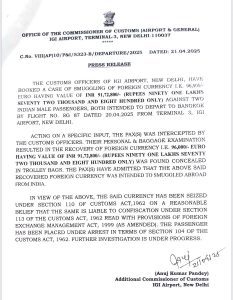New Delhi – In a significant breakthrough, customs officials at Delhi’s Indira Gandhi International Airport (IGIA) have thwarted an attempt at Delhi Airport currency smuggle involving foreign currency worth Rs 91 lakh. The operation, which took place on April 20, resulted in the arrest of two men who were allegedly attempting to transport the illicit funds to Bangkok, Thailand.
Detection and Interception
The Delhi Airport currency smuggle case came to light following a specific intelligence input received by customs authorities. Acting swiftly on the tip-off, officials intercepted the two suspects at Terminal 3 of the airport as they were preparing to board flight SG87 bound for Bangkok.

“Our vigilance team at IGIA had received credible information about a potential Delhi Airport currency smuggle attempt,” said a senior customs official familiar with the operation. “Based on passenger profiling and intelligence, we identified the suspects and placed them under surveillance from the moment they entered the terminal.”
The Delhi Airport currency smuggle attempt was foiled during the crucial pre-boarding phase, highlighting the effectiveness of intelligence-based targeting methods employed by customs officials at one of India’s busiest international gateways.
Search Operation and Recovery
Following the interception, customs officers conducted a thorough search of the passengers and their belongings. The meticulous examination revealed a sophisticated Delhi Airport currency smuggle technique, with the foreign currency expertly concealed to evade detection.
Also Read: Pahalgam Terror Attack: Shocking Strike Puts Major Cities on High Alert


“The search led to the discovery of €96,000 (approximately Rs 91 lakh) hidden in their luggage and personal effects,” the official statement confirmed. “The concealment method used in this Delhi Airport currency smuggle case shows a level of planning and preparation.”
Sources close to the investigation revealed that the Delhi Airport currency smuggle operation involved multiple layers of concealment, with the euros distributed across various compartments of their luggage and personal items. The currency was reportedly wrapped in carbon paper – a common tactic used to avoid detection by scanning equipment.
Legal Proceedings and Charges
Following the discovery, the foreign currency was seized under Section 110 of the Customs Act, 1962. The Delhi Airport currency smuggle attempt has triggered a series of legal actions against the accused.
“The currency has been seized on reasonable belief that it is liable for confiscation under Section 113 of the Customs Act, 1962, read with provisions of the Foreign Exchange Management Act (FEMA) 1999, as amended,” the customs statement detailed.
Both suspects involved in the Delhi Airport currency smuggle case have been placed under arrest in accordance with Section 104 of the Customs Act, 1962. They are currently in custody while investigations continue to determine the full extent of the smuggling network.
Legal experts note that this Delhi Airport currency smuggle case could result in significant penalties for the accused. Under FEMA regulations, currency smuggling can lead to penalties up to three times the value of the currency seized, in addition to potential imprisonment under the Customs Act.
Rising Trend of Currency Smuggling
This Delhi Airport currency smuggle incident is part of a concerning trend observed by enforcement agencies across India’s major international airports. Currency smuggling has emerged as a significant challenge for customs and enforcement authorities, with several similar cases reported in recent months.
“The Delhi Airport currency smuggle case represents just one instance of what appears to be a growing pattern,” explained a former Directorate of Revenue Intelligence official. “We’ve seen an uptick in currency smuggling attempts, particularly involving high-value European currencies and US dollars.”
Statistics from the past year indicate that customs officials at Delhi Airport alone have detected over two dozen Delhi Airport currency smuggle attempts, with seized foreign currency valued at several crores of rupees.
Experts point to various factors behind the rise in Delhi Airport currency smuggle incidents, including attempts to evade financial reporting requirements, money laundering, and financing of illicit activities.
Smuggling Techniques and Countermeasures
The methods employed in Delhi Airport currency smuggle cases have grown increasingly sophisticated, presenting new challenges for enforcement agencies. Common techniques include concealment in false bottoms of luggage, specially designed clothing with hidden compartments, and even modifications to personal items.
“Currency smugglers are constantly evolving their methods,” noted a customs official with expertise in anti-smuggling operations. “In recent Delhi Airport currency smuggle cases, we’ve seen everything from hollowed-out books to modified electronic devices used as concealment tools.”
To counter these evolving tactics, airports have enhanced their detection capabilities. The successful interception in this Delhi Airport currency smuggle case demonstrates the effectiveness of combining human intelligence with advanced scanning technology.
International Dimensions and Cooperation
The Delhi Airport currency smuggle attempt targeting Bangkok raises questions about international smuggling routes and networks. Thailand has long been identified as a significant transit point in various smuggling operations due to its strategic location in Southeast Asia.
“International cooperation is crucial in combating Delhi Airport currency smuggle operations,” emphasized a senior customs official. “We work closely with our counterparts in Thailand and other countries to share intelligence and track smuggling networks that operate across borders.”
Authorities are investigating whether the current Delhi Airport currency smuggle case is linked to larger international networks. The destination of the currency, its source, and the ultimate beneficiaries remain key questions in the ongoing investigation.
Economic Impact and Regulatory Response
Currency smuggling has significant economic implications beyond the immediate case. Each Delhi Airport currency smuggle incident represents a potential loss to the formal financial system and may indicate broader issues with capital flight.
“The economic impact of Delhi Airport currency smuggle operations extends beyond the value of seized currency,” explained an economist specializing in illicit financial flows. “These activities can distort exchange rates, facilitate tax evasion, and undermine financial regulations designed to maintain economic stability.”
In response to the rising challenge of currency smuggling, regulatory authorities have strengthened reporting requirements and enhanced coordination between financial intelligence units and enforcement agencies. The Delhi Airport currency smuggle case underscores the importance of these measures in protecting the integrity of India’s financial system.
Closing Remarks: Ongoing Investigation


As the investigation into this Delhi Airport currency smuggle case continues, authorities are working to uncover the full extent of the operation. “Further investigation is under progress,” the customs statement confirmed, suggesting that additional details may emerge as the case develops.
The Delhi Airport currency smuggle incident serves as a reminder of the ongoing challenges faced by enforcement agencies in combating financial crimes. With international travel resuming to pre-pandemic levels, customs officials remain vigilant against similar smuggling attempts.

